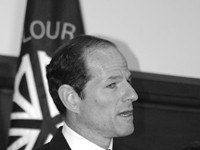[
{
"name": "500x250 Ad",
"insertPoint": "5",
"component": "15667920",
"parentWrapperClass": "",
"requiredCountToDisplay": "1"
}
]
Once again, Fairport's taking a stand.
The school district that made a name for itself by taking on Albany and refusing to adopt a budget until the state adopted one of its own is digging its heels in again.
This time, the opponent is a bit more formidable: the Pentagon.
The impending showdown is over the district's interpretation of a little-known provision in the No Child Left Behind act: School districts are required to turn over information about students, including addresses and phone numbers, to military recruiters. NCLB also stipulates that military recruiters must have the same access granted other recruiters --- college admissions counselors, for example.
Parents and guardians are granted the right to block the release of student information. Up to that point, Fairport and the US military agree. The trouble comes over how the district notifies parents of that right.
"The military is claiming there is only one way to do it," says Fairport Superintendent Bill Cala. He describes what the military wants as "the passive way." The military has argued the law allows the district to withhold student information only if parents specifically request that. Fairport's policy requires more participation from its parents.
The district sends a letter to every parent explaining the new rule, and there are boxes for parents to check either "yes" or "no" to the release of their child's information. Then Fairport takes it one step further:
"We won't act on releasing the information until the parents return [the letter]," Cala says. Such a system amounts to an opt-in policy rather than the opt-out policy suggested in the legislation's language, the military has argued.
Fairport has had that system since No Child Left Behind was enacted. "We're the only one in the country," Cala says. And the district has no plans to abandon it.
"Our position is firm," Cala says. "We're not backing off. We feel we're right."
That stance has earned Cala what he calls "threatening" phone calls from local recruiters. Cala says the recruiters say they will take the matter to their higher-ups if the district doesn't change its policy.
Apparently that's already happened: Cala says the Pentagon has contacted him, and he's now negotiating a time to chat with an Army colonel.
What's comes next is unclear. The New York State Civil Liberties Union has been working with Fairport and may represent the district if the matter goes to court.
But regardless of the outcome of his meeting with the Washington-based Army officer, Cala believes he knows what to expect. In California, after several districts adopted policies similar to Fairport's, the Defense Department and the federal Education Department pressured the California Education Department to bring schools back into line by threatening a loss of federal funding, says Cala.
"I suspect that's all going to happen here," Cala says.
One reason Cala can face down the Pentagon more confidently than many other school administrators is the support he enjoys from parents and students in his district. Asked whether he's fielded any criticism about the district's system from parents, Cala responds with an emphatic "no."
"I've not had any complaints," he says. "Why would anyone complain that they're being adequately notified?"
Among Fairport's students who are sympathetic to what Cala's doing are members of a student-run organization devoted to peace and justice issues --- the Fairport High School Peace Club.
"We formed three years ago when there was talk of invading Iraq," says senior Michael Freeman, one of the club's leaders. After the invasion, he says, the group succumbed to a sense of helplessness. That started to change when the students noticed military recruiters in their school hallways. Freeman declines to label the club's activities as "counter-recruiting" (an activity that has an identity and history of its own, dating back at least to the Vietnam conflict). Instead, he says, the club was "just giving information and basic facts" to fellow students, like the number of soldiers killed in the current conflicts in Iraq and Afghanistan.
Freeman says those actions prompted a verbal confrontation between him and some of the Marine recruiters toward the end of the last fall semester. After a similar incident involving another student, Freeman says, principal David Paddock asked the recruiters to leave the building.
Now the recruiters are back, but in the meantime the students have been doing some studying. "We've been finding out about the conduct that governs recruiters," Freeman says. One rule that the group intends to push is one Freeman says is designed for the recruiters' protection; it requires a school official to be present when recruiters meet with students.
"Even being in a place where there's a secretary or some adult around, the recruiters wouldn't lie to kids," Freeman says. The group also plans to dive into the world of counter-recruitment.
The Rochester school district once banned military recruiters because of the military's "don't ask, don't tell" policy toward homosexual students. That ban bit the dust with the No Child Left Behind act requiring school access for recruiters.
And compared to Fairport, the Rochester district uses a soft way of telling parents about the release of information to military recruiters. In the district's yearly calendar --- 48 pages packed full of information --- parents are told that they may tell the district not to release student records without written consent. That notification is on pages 13 and 14 --- and doesn't include the word "military."
The Rochester district's attorney, Michael Looby, says the district is more concerned with recruiters' behavior around students on school grounds than whether they call or write those students at home. The district has adopted extensive policies reflecting that concern. It allows counter-recruiting, for example, and other measures that moderate the influence of recruiters, while still fully complying with the law.
But even if the Rochester district wanted to mimic Fairport, the district could probably ill-afford to do so. Fairport's stance could jeopardize its federal funding. "It's not that large," says Cala, "but it's large enough that we can't afford to ignore it." "Not that large" is about 4 percent of Fairport's $86 million budget.
For the cash-strapped city district, the figure would be considerably higher; it gets nearly 6 percent of its budget --- $34.6 million --- from Uncle Sam.
And while Cala may be diligent in protecting the interests of his students, it's likely that fewer Fairport students than city students would be interested in joining the military. Of the 1,600 Fairport students in grades 10 through 12, only 78 opted to release their contact information to the military. Perhaps that's because more than 90 percent are headed to college.
City school district officials say they don't even know how many graduates attend college. The number of students who return exit surveys asking about future plans is too small to be statistically significant, the officials say. And the military may be an attractive option to many city students, given the district's large number of poor and low-income students.
One city school administrator who supports Fairport's stand is School Without Walls principal Dan Drmacich. With the military struggling to enlist young people in a time of war, city schools may be attractive recruiting places, says Drmacich. If the district's students "are having a hard time finding jobs, they would tend to be prime pickings for the government," he says.
Placing information about notification rights in the Rochester school district's calendar isn't enough, he says. "The average low-income parent doesn't have time to pursue that."
Drmacich says he's not out to kick the military out of schools, and he acknowledges military recruiters' right under NCLB to parity with other recruiters.
"But going to Brockport versus going to Iraq --- there's some serious differences about the consequences for young people," he says.
The goal, he says, is the right to inform parents and students "in a more upfront manner."
"I think the bottom line is just to be fair to students and parents" when releasing information, he says. "It's unfair. We're not giving a true picture of what the alternatives are and what the consequences are."
Drmacich would like to see the city district follow Fairport's lead, calling its approach one that "makes sense." And he says he hopes that if Fairport succeeds in keeping its policy intact, others will follow suit.
"I'm sure that various districts are just looking for someone to challenge it," he says.
Latest in News
More by Krestia DeGeorge
-

The last wild Finger Lakes
Jan 17, 2007 -

Designers get their turn at downtown
Jan 17, 2007 -

From the new governor: fighting words
Jan 10, 2007 - More »






